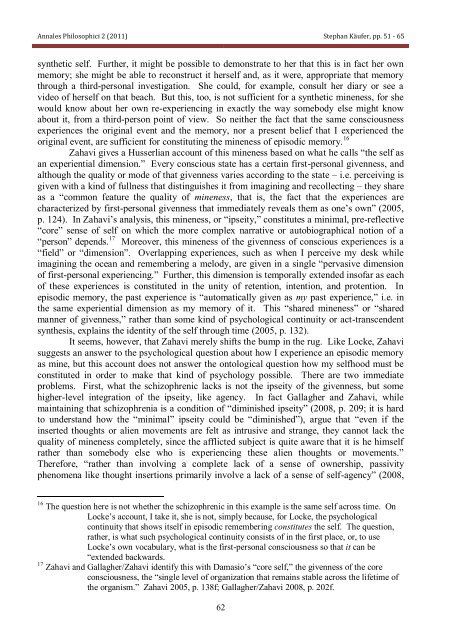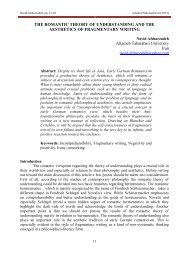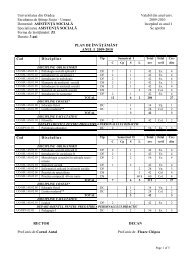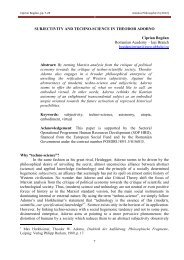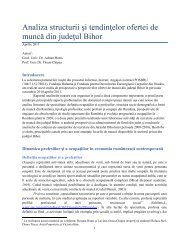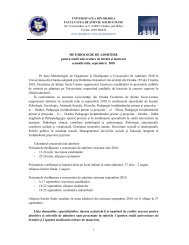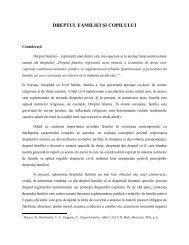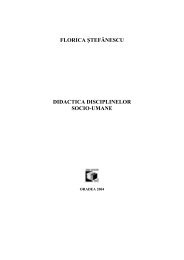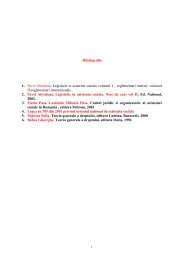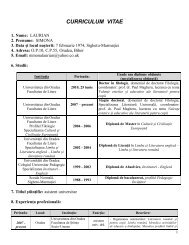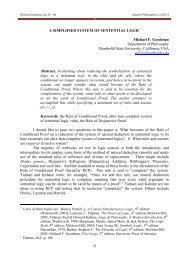Stephan Käufer: HEIDEGGER ON MINENESS AND MEMORY
Stephan Käufer: HEIDEGGER ON MINENESS AND MEMORY
Stephan Käufer: HEIDEGGER ON MINENESS AND MEMORY
You also want an ePaper? Increase the reach of your titles
YUMPU automatically turns print PDFs into web optimized ePapers that Google loves.
Annales Philosophici 2 (2011) <strong>Stephan</strong> <strong>Käufer</strong>, pp. 51 - 65<br />
synthetic self. Further, it might be possible to demonstrate to her that this is in fact her own<br />
memory; she might be able to reconstruct it herself and, as it were, appropriate that memory<br />
through a third-personal investigation. She could, for example, consult her diary or see a<br />
video of herself on that beach. But this, too, is not sufficient for a synthetic mineness, for she<br />
would know about her own re-experiencing in exactly the way somebody else might know<br />
about it, from a third-person point of view. So neither the fact that the same consciousness<br />
experiences the original event and the memory, nor a present belief that I experienced the<br />
original event, are sufficient for constituting the mineness of episodic memory. 16<br />
Zahavi gives a Husserlian account of this mineness based on what he calls ―the self as<br />
an experiential dimension.‖ Every conscious state has a certain first-personal givenness, and<br />
although the quality or mode of that givenness varies according to the state – i.e. perceiving is<br />
given with a kind of fullness that distinguishes it from imagining and recollecting – they share<br />
as a ―common feature the quality of mineness, that is, the fact that the experiences are<br />
characterized by first-personal givenness that immediately reveals them as one‘s own‖ (2005,<br />
p. 124). In Zahavi‘s analysis, this mineness, or ―ipseity,‖ constitutes a minimal, pre-reflective<br />
―core‖ sense of self on which the more complex narrative or autobiographical notion of a<br />
―person‖ depends. 17 Moreover, this mineness of the givenness of conscious experiences is a<br />
―field‖ or ―dimension‖. Overlapping experiences, such as when I perceive my desk while<br />
imagining the ocean and remembering a melody, are given in a single ―pervasive dimension<br />
of first-personal experiencing.‖ Further, this dimension is temporally extended insofar as each<br />
of these experiences is constituted in the unity of retention, intention, and protention. In<br />
episodic memory, the past experience is ―automatically given as my past experience,‖ i.e. in<br />
the same experiential dimension as my memory of it. This ―shared mineness‖ or ―shared<br />
manner of givenness,‖ rather than some kind of psychological continuity or act-transcendent<br />
synthesis, explains the identity of the self through time (2005, p. 132).<br />
It seems, however, that Zahavi merely shifts the bump in the rug. Like Locke, Zahavi<br />
suggests an answer to the psychological question about how I experience an episodic memory<br />
as mine, but this account does not answer the ontological question how my selfhood must be<br />
constituted in order to make that kind of psychology possible. There are two immediate<br />
problems. First, what the schizophrenic lacks is not the ipseity of the givenness, but some<br />
higher-level integration of the ipseity, like agency. In fact Gallagher and Zahavi, while<br />
maintaining that schizophrenia is a condition of ―diminished ipseity‖ (2008, p. 209; it is hard<br />
to understand how the ―minimal‖ ipseity could be ―diminished‖), argue that ―even if the<br />
inserted thoughts or alien movements are felt as intrusive and strange, they cannot lack the<br />
quality of mineness completely, since the afflicted subject is quite aware that it is he himself<br />
rather than somebody else who is experiencing these alien thoughts or movements.‖<br />
Therefore, ―rather than involving a complete lack of a sense of ownership, passivity<br />
phenomena like thought insertions primarily involve a lack of a sense of self-agency‖ (2008,<br />
16 The question here is not whether the schizophrenic in this example is the same self across time. On<br />
Locke‘s account, I take it, she is not, simply because, for Locke, the psychological<br />
continuity that shows itself in episodic remembering constitutes the self. The question,<br />
rather, is what such psychological continuity consists of in the first place, or, to use<br />
Locke‘s own vocabulary, what is the first-personal consciousness so that it can be<br />
―extended backwards.<br />
17 Zahavi and Gallagher/Zahavi identify this with Damasio‘s ―core self,‖ the givenness of the core<br />
consciousness, the ―single level of organization that remains stable across the lifetime of<br />
the organism.‖ Zahavi 2005, p. 138f; Gallagher/Zahavi 2008, p. 202f.<br />
62


